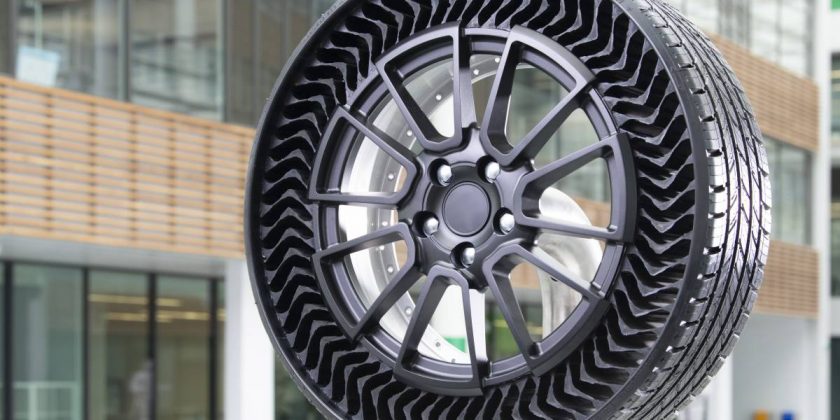Michelin has showcased the Uptis airless tyre for the first time in public at IAA Munich 2021, demonstrating its capabilities to members of the public in attendance at the recent motor show in Germany. The new tyre technology was fitted to a zero-emissions MINI Electric.
“Our greatest satisfaction came at the end of the demonstration when our passengers, who were admittedly a little wary at first, said they felt no difference compared with conventional tyres,” Michelin group technical and scientific communications director Cyrille Roget said.
An abbreviation of Unique Puncture-Proof Tire System, the Uptis is on track for its market introduction in 2024, the French brand reiterated. The Uptis combines an aluminium wheel with a load-bearing structure made of glass fibre-reinforced plastic (GFRP) as well as flexible rubber composites, and these fit on conventional wheels.
With punctures no longer a concern for airless tyres such as the Uptis, this development will be kinder to the environment. An in-house survey by Michelin has found that 20% of all tyres are discarded prematurely every year due to flats and rapid pressure loss, as well as due to irregular wear due to incorrect inflation. This totals 200 million wasted tyres, equivalent to 200 times the weight of the Eiffel Tower, says Michelin.
The Uptis comes as the first step in Michelin’s Vision Concept, says the company, towards its goal of becoming a manufacturer of tyres from fully sustainable materials and processes by 2050. As of earlier this year, nearly 30% of the components in the manufacture of Michelin tyres are from natural, recycled or otherwise sustainable sources, Michelin said.
Subsequent tyre innovations under the Vision Concept also include “rechargeable” tread, or in other words worn tread that can be revitalised through additive rubber 3D printing which can offer several possibilities such as different tread patterns for different climates or conditions. The third step in the Vision Concept is to offer connected technologies, where data gathering can be applied towards road safety, fleet management for commercial applications as well as for high-performance scenarios such as track days.
Source: Read Full Article



